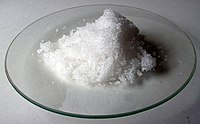
Photo from wikipedia
Objectives Studies have shown conflicting findings for association of processed meat with risk of colorectal cancer (CRC); with some studies showing an increased risk while others having no associations. Few… Click to show full abstract
Objectives Studies have shown conflicting findings for association of processed meat with risk of colorectal cancer (CRC); with some studies showing an increased risk while others having no associations. Few studies have been done to study this association with salt (sodium) intake that is high in processed meats. Methods A comprehensive, systematic literature search was conducted on PubMed and Google.com to identify observational studies on dietary salt (sodium) intake for prevention of CRC. 1933 titles were identified and screened of which 86 abstracts were selected for full-text review; finally, 7 studies were included. Results In case-control studies from Jordan on 169 CRC cases (248 matched controls), from Siberia on 185 cases (210 matched controls), and from Greece on 250 cases (250 controls), high sodium intake was significantly associated with an increased CRC risk (highest to lowest quartile, OR = 3.42, 95% CI: 1.59-7.38; high vs. medium salt in food, OR = 3.45, 1.68-7.1; and added table salt yes vs. no, OR = 1.62, 1.05-2.49, latter got attenuated when adjusted for overall dietary habits, OR = 1.41, 0.90-2.20; respectively). However, in another case-control study from Australia on 715 cases (727 matched controls), high sodium intake was not associated with CRC (RR = 1.23, 0.9-2.4, P = 0.11). Similar for sub-group of colon cancer but significant only for rectal cancer (RR = 1.61, 1.1-2.3, P = 0.006). In a prospective cohort study from Japan on 81,578 subjects free of cancer/CVD at baseline, no association was found for sodium and CRC (highest vs. lowest quartile, HR = 1.10, 0.85-1.42, P-trend = 0.51). Other study designs have also shown increased risk. A cross-sectional study from Oman on 405 participants showed that eating food high in salt (26.8%) was a risk factor for stomach and colorectal cancer with significant associations in young age groups and with higher education. Lastly, in a comparative ecological study from South Africa, sodium intake was higher in West coast fishermen (6 CRC cases over 5 years/120,000) vs. urban Cape Town inhabitants (677/2 million). Conclusions Majority of studies were case-control design, most of which showed positive association between sodium intake and CRC. Cross-sectional/ecological studies support this. Meta-analysis needs to be done to increase sample size and explore potential heterogeneity. Funding Sources None.
Journal Title: Current developments in nutrition
Year Published: 2019
Link to full text (if available)
Share on Social Media: Sign Up to like & get
recommendations!